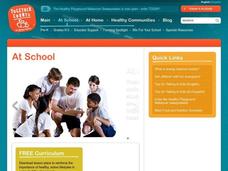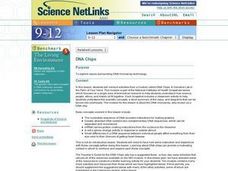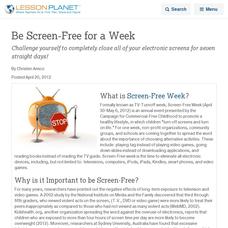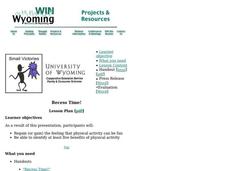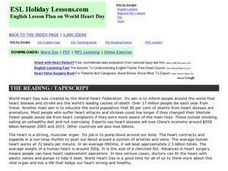Curated OER
I Can Balance. You Can Balance.
It's disturbing to think that one third of children born after the year 2000 will suffer from diabetes and perhaps be the first generation to live shorter lives than their parents! Too many youngsters are not eating properly and are not...
Curated OER
Get the Skinny on Milk
Students identify the different types of milk available in the market. In this adult health science lesson, students compare their nutrition information. They read milk labels and analyze the nutrients in it.
Curated OER
Dietary Rules
Healthy eating habits is the focus of this resource. Learners discuss fat and cholesterol, caloric needs, and the importance of exercise. There is a worksheet and a handout of dietary guidelines to supplement the information provided.
Curated OER
I Can Balance. You Can Balance.
There are many, many reasons why people do not maintain an energy balance. Talk to your young learners about balance, what gets in the way of eating healthy, and things that get in the way of doing physical activity. Some obstacles may...
Curated OER
Fit With Fiber
Sixth graders investigate the nutritional value of different types of cereal. They take a survey of students that ate breakfast and create a circle graph with the results. Students examine the nutritional information on the sides of the...
Curated OER
Fit For Life: Eat Smart and Exercise
Students examine the problem of obesity among teenagers. They view a video and discuss what could be done to avoid becoming overweight. They also explore the importance of exercise.
Curated OER
DNA Chips
Students explore issues surrounding DNA microarray technology. They focus on a single area of biomedical research to help them explain how science, people, ethics, and history all fit together. They analyze gene-expression data.
Curated OER
Conflicts in Government Policy Objectives
Students consider a series of arguments for a particular set of policy proposals that have wide ranging implications not only to the non-economic objectives of a government but also to the wider efficiency and equity of the economy as a...
Curated OER
Tort Hypotheticals
Students review the use of intentional torts. In groups, they use specific statements and use them in hypothetical situtations. For each category, they write a statements about the situation and discuss them as a class. They complete a...
Curated OER
Snack Smart, Move More
What do lowfat yogurt, baby carrots, fresh fruit, and rice cakes have in common? They are all healthy snacks that can be eaten daily. Investigate healthy eating/snacking guidelines, learn how to make lowfat ice cream and practice some...
Curated OER
FACS: Exercise Physiologist
Present the exciting career of an exercise physiologist to your teens with a PowerPoint. The slide show explains what this professional does, the education required, the job atmosphere, salary range, and prospects. Finally, viewers will...
Curated OER
Get Acquainted with the Great Outdoors
National Parks and Recreation Month offers opportunities to improve health and education.
Curated OER
Be Screen Free for a Week
Challenge yourself to completely close all of your electronic screens for seven straight days!
Curated OER
Benefits of Physical Activity
Identify at least five benefits of physical activity and guide students to experience fun feeling healthy. Your class will participate in the Synchronized Chair Dance. Worksheet and Evaluation are included.
Curated OER
When One Beat Is Better Than Two
Fourth graders create an individualized wellness plan that addresses these controllable health risk factors:obesity, high cholesterol level, high blood pressure and inactivity.
Curated OER
Fast Food Junkie
Fourth graders study their favorite fast food meal and analyze their nutritional value.
Curated OER
World Heart Day
In this World Heart Day worksheet, students complete activities including reading a passage, matching phrases, fill in the blanks, correct word choosing, multiple choice, sequencing, unscramble the sentences, write questions, take a...
Curated OER
Beating the Odds
Students act as medical researchers and investigate the development of artificial heart, heart assist devices and other advancements in cardiology. They report their findings, both orally and visually, to their 'colleagues' at a conference.
Curated OER
Health and Nutrition
Students examine vocabulary words that deal with the parts of the body. They identify the body parts and organs associated with the five senses. They identify common illnesses, causes and treatments. They research various lifestyle...
Curated OER
Heart Smart in a Heart Beat
As an introductory activity, young statisticians measure their heart rate at rest and after exercise and compute the mean and median, and create a box & whisker plot. This is followed by watching a video (that no longer seems to...
Curated OER
Introduction to Coral Reefs
Students identify locations of coral reefs, both in the water and around the globe, identify relative depth of corals in the ocean by observing behavior of cold and warm saltwater, and create models of coral reefs.
Curated OER
Changing unhealthy eating habits
Learners identify the elements of a balanced diet, then compile a daily diet and exercise log to assess their lifestyles and improve them if applicable. They recognize and explain the importance of proper nutrition practices.
Curated OER
Life Science: Human Body Skit
Students create skits based on the human body systems. Working in groups, they role-play as organs in the various systems. They make costumes or wear signs identifying themselves as the organs in their skits.
Curated OER
Marine Mammal Diving Reflex
Tenth graders discuss marine mammal diving reflex, and measure pulse rate while holding their breath under three conditions: control, warm water, and ice water to determine if humans exhibit marine mammal diving reflex.


